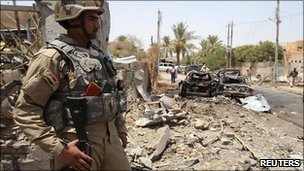 The US has disagreed with Iraqi assertions that July was the deadliest month there for more than two years.
The US has disagreed with Iraqi assertions that July was the deadliest month there for more than two years.
According to the US military, 222 Iraqis died in July - fewer than half the 535 Baghdad says lost their lives.
The US released its own figures after Baghdad's information prompted concern that insurgents are exploiting a post-election power vacuum.
Insurgent attacks have increased amid failure to form a government since inconclusive elections in March.
Sunni, Shia and Kurdish factions that won most seats are still bickering over who should be the next prime minister.
Both former Prime Minister Iyad Allawi and incumbent Nouri Maliki insist that they are best placed to lead the war-torn country.
March's elections left Mr Allawi's Sunni-backed secular Iraqiyya alliance with 91 seats, just two ahead of Mr Maliki's mainly Shia coalition.
Both are well short of the 163 seats needed to form a government, meaning that some sort of wider coalition will be needed.
People are getting fed up with the stalemate, the BBC's Hugh Sykes reports from Baghdad.
It is very hot - above 50C (122F) some days - but there are incessant power cuts, and there have already been street demonstrations complaining about the failure to provide enough electricity for fans, air conditioners and fridges.
And violence is beginning to re-occupy the political vacuum, our correspondent says.
The US offered no full explanation as to why its casualty figures differed so markedly from those issues by the Iraqi authorities.
As well as a higher death toll - 535 compared to 222 - the Iraqi figures also suggested more than 1,000 Iraqis were injured during July. The US, in contrast, said 782 were hurt.
"The claim that July 2010 was the deadliest month in Iraq since May 2008 is incorrect," a US military statement noted.
Also On Sunday, one of the main Shia blocs rejected Mr Maliki's claim to a second term as prime minister, saying it would pull out of coalition talks until his party nominated a new candidate.
The Iraqi National Alliance (INA) came third in March's polls, and had merged with Mr Maliki's second-placed State of Law bloc in June.
Under the new name, National Alliance, it has a total of 159 seats in the new 325-seat parliament, four short of a majority.
"All parties of the INA have agreed that the obstacle is the insistence of nominating Maliki," one of the group's senior members, Qusay al-Suhail, told Reuters news agency.
"That is why we demanded an alternative... The INA's decision is unanimous."
The move is another setback in the process of forming a new government, which analysts predict may take until at least mid-September.
There are fears the ongoing political uncertainty could hinder the planned withdrawal of all but 50,000 US troops from Iraq by the end of August, in preparation for a full military departure by the end of 2011.
The post-election increase in attacks follows a drop in the levels of violence in 2006 and 2007 when Sunnis and Shia fought a bloody sectarian conflict.
Two weeks ago, a suicide bomber killed 43 people and injured 40 more south-west of Baghdad.
That attack targeted government-backed Sunni militia members lining up to be paid.
Last week, two car bombs exploded near the southern city of Karbala, killing at least 19 people on the road from the city of Najaf.
The road is often used by Shia pilgrims travelling to shrines.



